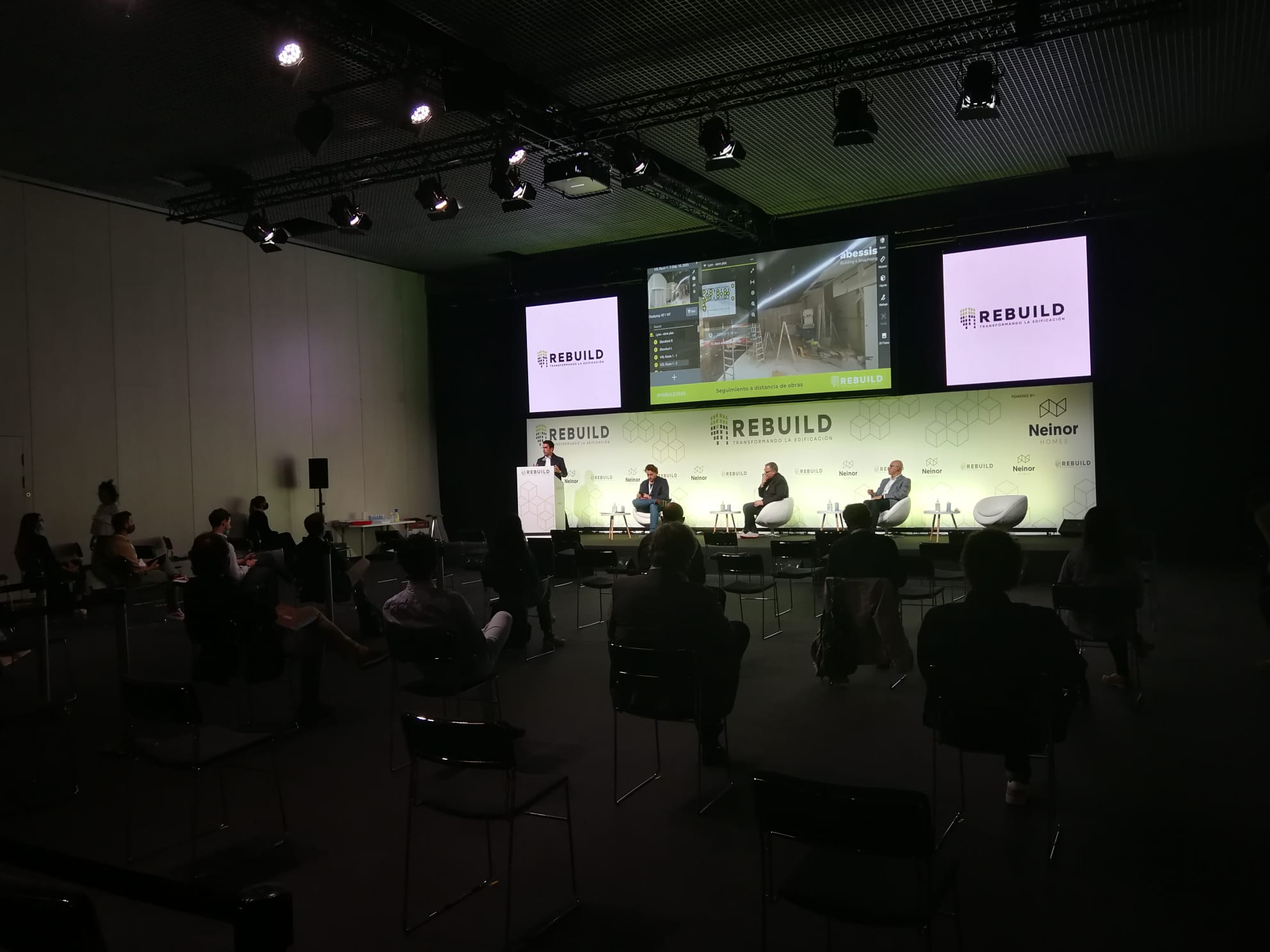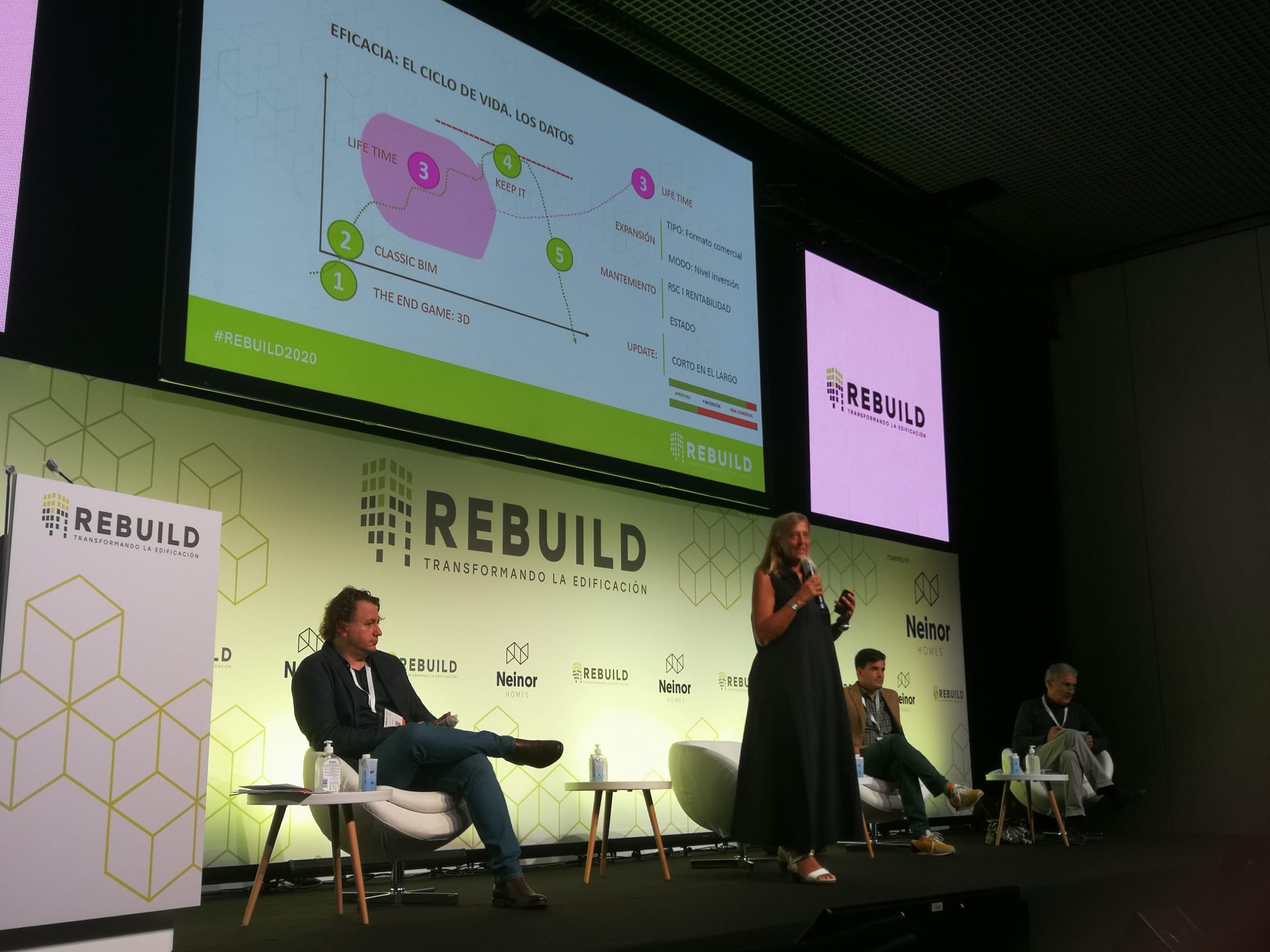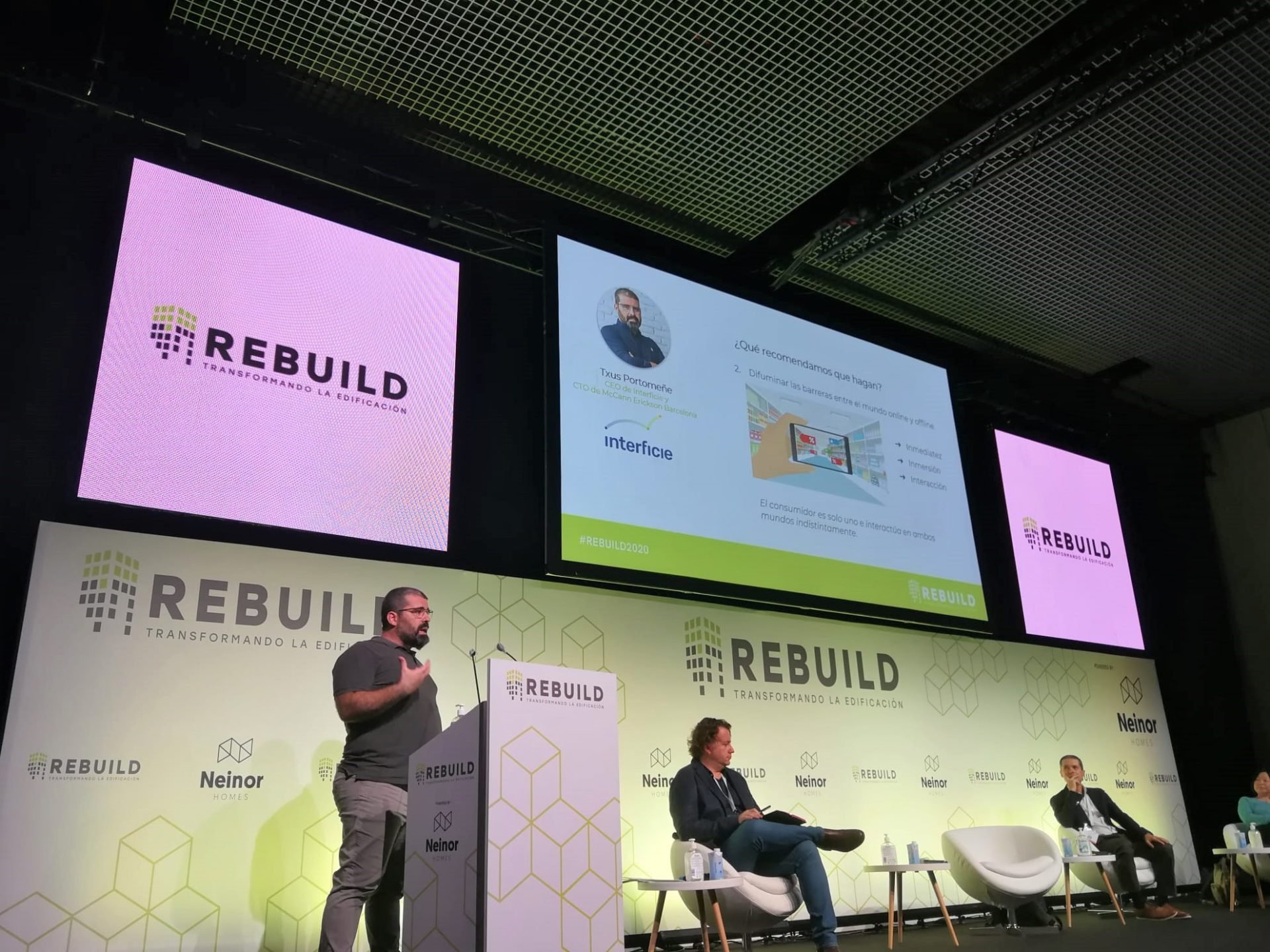The innovation fair for building, REBUILD 2020, has finished a new edition at the Barcelona International Convention Center (CCIB). More than 4000 visitors, 100 exhibiting firms and 261 speakers have gathered among strong security measures against the covid. During Thursday afternoon, Grup Idea and Abessis participated in a scheduled session within the ‘Retail Vertical’, a set of sessions to talk about innovation in the management of space design, tools for building and technology in the retail sector.
The 3Rs in Retail: REPENSAR, REBUILD, RETAIL
Retail is the sector in which a greater dose of research and development is carried out and the way of building spaces is completely changing. Miquel Àngel Julià Hierro, architect director of Strategy and Design at Grup Idea and Vice President of the Retail Design Institute Spain, has moderated the three round tables of the ‘Retail Vertical’,a set of sessions with a total of nine expert speakers from the sector. during Rebuild 2020. In the first session, aspects from the industrialization of the architectural project, the new processes to improve the management, operation and maintenance phase and the evolution and excellence in construction have been addressed.
For Francesc Máñez, CEO of QMax Retail Solutions, the methodology in project management is key since it is the connecting door between the client and the brand and must be adaptable. Technology is only a tool to make projects more integrated, accessible and scaled. Despite technological advances, the human factor will be fundamental: “90% of successful projects are built on trust with the client.”
Lluís Sáiz, partner, Business & Development Manager of Grup Idea, has insisted that “without management there is no good design” and that an essential task is to make good design last. With too many options to tackle projects, the architect must know the client’s design preferences and needs, where they are going, and take clear action with the support of management tools. ”These tools allow you to work more flexibly, document every step and gain productivity. With updated and available information, we can learn from each project and design earlier and better”. On the other hand, the transformation of spaces is accelerating and requires a lot of adaptability. “The flexible office is a good example, but this adaptability should apply to all spaces”, concluded.

Good planning is also a decisive aspect in the management of the works. Juan Guaita, Business & Development Manager at Abessis, construction company of Grup Idea, explained how construction is a sector with little evolution, often with very fair work deadlines and that brands must value and retain the construction company to obtain better results. In addition, it has presented a software for the monitoring of works at a distance that helps optimize processes and save time. “With this new Tool we can attend a virtual visit of any work through software and a 360º camera”, explained about the incorporation of the Holobuilder platform in Abessis services.
Towards a BIM for RETAIL
During the second round table, the role of BIM (Building Information Modeling) in Retail was analyzed. The digitization of the products for sale or of the infrastructures that are used as sales furniture open a totally different way of understanding the architectural project of Retail.
In the first intervention, María Callis, president of the Retail Design Institute Spain, insisted that BIM should be a personalized model for each retail company and that it should be solved from integration. This data management process is necessary since companies are complex businesses, based on increasingly sophisticated phygital experiences. Furthermore, it is an environment where uncertainty, change and the search for profitability are very common.

In addition to the search for efficiency through data, the architect and consultant in Facility Management Felip Neri Gordi has spoken of the importance of putting the client at the center through Facility Management (FM). “We have designed too long without thinking about people and FM is currently the factor to readapt buildings to new conditions and must contribute its knowledge in the planning of the project.” In Retail, he explained, our conscious and subconscious must embrace the stages where our day to day passes and pivot towards an efficient, sustainable and charming world.
The third speaker, Adrian Used, has spoken about his experience in atBIM Building Engineering, an architecture and engineering consultancy that applies the BIM methodology. “Through the sensors we can monitor if the retail customer stops in one or the other linear and improve the design. We are able to know what problem there is in the store and also find the most optimal solution”, he explained.
XR-Experience reality. Virtual media for physical reality
In the last session, the topic of virtual media for physical reality, the integration of digital projects and the offline world and the use of data to improve the user experience in the physical store have been addressed. Txus Portemeñe, CEO of Interficie and CTO of McCann Worldgroup Barcelona; Enric Quintero, General Manager at Beabloo and Yuka Nakasone, Chief Strategist at Global Bridge have taken part.
From Interficie, a software development company with Internet technology, Txus Portemeñe is in charge of executing the complete cycle of digital projects: consulting, architecture, UX-UI design, development, maintenance and continuous improvement. With a technical team of programmers, he has developed more than 400 digital projects.
The most important thing, he highlighted “is to keep a real omnichannel strategy, blur the barriers between the online and offline world and place the customer at the center”. In this way, he explained, with a more personal communication the user experience is sublimated and relevant information is obtained. Through the Project Design Hub for Hotel Barceló, for example, they designed a co-creation model so that the same interior designers and architects from Barceló’s VIP database would make decisions about the future design of the hotel.

Also Enric Quintero, through Beabloo, seeks to improve the user experience in the offline world with the aim of increasing sales and increasing user satisfaction. “The webs exploit information a lot but the physical world does not,” he declared. With Beabloo they use overhead cameras, screens, digital signs and people counters in physical stores to know the flow of users and launch much more precise customized campaigns through data technology.
With a much broader perspective, Yuka Nakasone, from Global Bridge, has spoken of the future of the retail industry from a historical and anthropological point of view. According to Nakasone, we are heading towards Industry 5.0, where we will move from IoT (Internet of Things) and IOH, (Internet for Humans), to IoE, Internet of Everything, in which we will begin to interact with artificial intelligence without a computer.
As Miquel Àngel Julià concluded, “there is no longer the need to go to the store, but rather the desire of the consumer to go to experience the brand.” And he raised the question: if with smartphones apart from many other uses, we can do calls, why not design smart shops in which to understand the space as a place of socialization and creative meeting point between consumers and brand without the need to make a purchase?.

